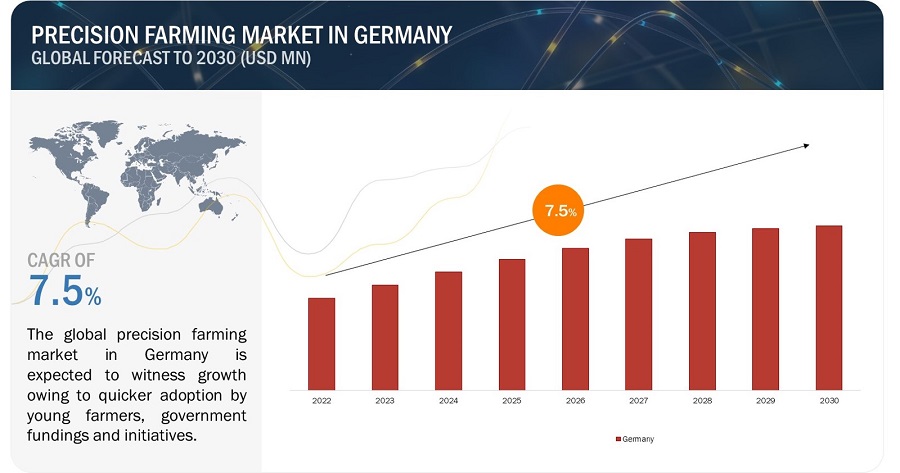Germany Precision Farming Industry to Grow at a CAGR 7.5% from 2022 to 2030
According to a research report "Germany Precision Farming Market by Technology (Guidance, Remote Sensing and Variable Rate Technology), Offering, Application, and Region (Americas, Europe, Asia Pacific, Rest of the World) - Global Forecast to 2030" published by MarketsandMarkets, Germany Precision Farming Market to Grow at a CAGR 7.5% from 2022 to 2030.
Germany to dominate the precision farming market in Europe between 2022 and 2030
Germany is a pioneer in the adoption of precision farming-related technologies in Europe. Germany's agriculture industry is becoming more and more dependent on the advanced technologies related to precision farming market. A third of Germany's territory is devoted to agriculture, making it one of the world's top producers of agricultural products. German farmers are implementing precision farming technologies and strategies to increase crop yields, cut expenses, and lessen the environmental effect of agriculture. Germany's dedication to sustainable agriculture is one of the major factors influencing the precision farming sector in Germany. One more factor which will lead to the growth of the market in Germany is that the average age of farmers in Germany is increasing, and younger farmers are more likely to adopt new technologies and practices. This demographic shift is leading to increased adoption of precision agriculture practices.

The German Federal Ministry of Education and Research (BMBF) provides funding for developments in automated farming techniques. The adoption rate of agricultural drones for crop and livestock monitoring is high in the country. One-tenth of the farmers in Germany are utilizing drones, which is indicative of the role of farmers in digitization in the sector. The size of the farms in the country is often more than 50 hectares, larger than whole farms elsewhere in Europe. The major factors driving the growth of the precision farming market in Germany include the optimized agricultural supply chain; lack of experienced and skilled labor force leading towards farm automation; and significant foreign direct investments (FDIs) in the agriculture industry. However, uncertainty regarding government support and the shrinking income of farmers are some of the factors that are limiting the market growth.
Germany has set significant targets for enhancing soil quality, lowering greenhouse gas emissions from agriculture, and fostering biodiversity. Inputs like fertiliser and pesticides can be reduced while crop yields are increased owing to precision farming technologies like soil sensors, drones, and irrigation systems. The presence of government funding and support is a significant factor influencing the precision agricultural business in Germany. The "Digital Farming 2025" program, which strives to accelerate the adoption of digital technologies in agriculture, is one of many efforts the German government has initiated to encourage precision farming. The program offers support for both research and development and for putting precision farming technologies into practise on farms. Other government policies, such as the Renewable Energy Act and the National Action Plan on Sustainable Use of Plant Protection Products, have also supported the growth of precision agriculture.
Germany’s agricultural industry is characterized by a high degree of mechanization, as well as increasing land concentration and an ongoing reduction of the total number of farms. Digitalization is one of the key strategies put forward by the German government to renew its agricultural industry. According to a survey conducted by the Humboldt-Universität zu Berlin, ~80% of farmers use some form of digital technology. High labor costs, as well as the difficulties in finding skilled labor, are key factors forcing farmers to invest in precision farming.
Topcon Precision Agriculture (US), Steel Tec Farm GmbH (Germany), HAWE-Wester GmbH & Co. KG (Germany), AgriCon GmbH (Germany), and Trimble Inc. (US) are a few major manufacturers of precision farming equipment in Germany. These companies provide equipment for applications in yield monitoring, field mapping, variable rate application (VRA), agricultural contractors and machinery rings, trailers for family farming, and crop scouting.
About MarketsandMarkets™
MarketsandMarkets™ provides quantified B2B research on 30,000 high growth niche opportunities/threats which will impact 70% to 80% of worldwide companies’ revenues. Currently servicing 7500 customers worldwide including 80% of global Fortune 1000 companies as clients. Almost 75,000 top officers across eight industries worldwide approach MarketsandMarkets™ for their painpoints around revenues decisions.
Our 850 fulltime analyst and SMEs at MarketsandMarkets™ are tracking global high growth markets following the "Growth Engagement Model – GEM". The GEM aims at proactive collaboration with the clients to identify new opportunities, identify most important customers, write "Attack, avoid and defend" strategies, identify sources of incremental revenues for both the company and its competitors. MarketsandMarkets™ now coming up with 1,500 MicroQuadrants (Positioning top players across leaders, emerging companies, innovators, strategic players) annually in high growth emerging segments. MarketsandMarkets™ is determined to benefit more than 10,000 companies this year for their revenue planning and help them take their innovations/disruptions early to the market by providing them research ahead of the curve.
MarketsandMarkets’s flagship competitive intelligence and market research platform, "Knowledgestore" connects over 200,000 markets and entire value chains for deeper understanding of the unmet insights along with market sizing and forecasts of niche markets.
You may also intrested in :
France Precision Farming Market
South Korea Precision Farming Market
UK Precision Farming Market
China Precision Farming Market
Japan Precision Farming Market
Contact:
Mr. Aashish Mehra
MarketsandMarkets™ INC.
630 Dundee Road
Suite 430
Northbrook, IL 60062
USA : 1-888-600-6441
sales@marketsandmarkets.com
- Triangulate with your Own Data
- Get Data as per your Format and Definition
- Gain a Deeper Dive on a Specific Application, Geography, Customer or Competitor
- Any level of Personalization
- What are the Known and Unknown Adjacencies Impacting the Precision Farming Market
- What will your New Revenue Sources be?
- Who will be your Top Customer; what will make them switch?
- Defend your Market Share or Win Competitors
- Get a Scorecard for Target Partners







